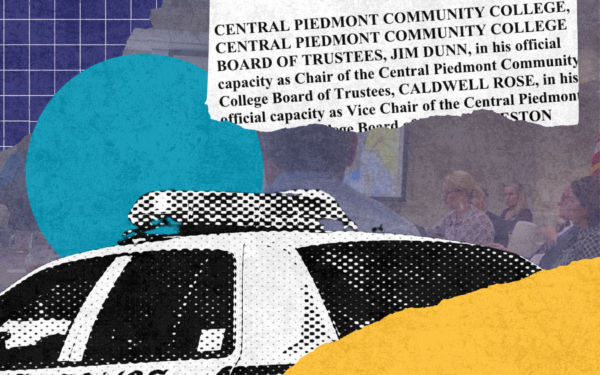Update (June 3, 2025): SCSJ’s lawsuit against CPCC and its Board of Trustees was removed from Mecklenburg County Superior Court to the U.S. District Court for the Western District of North Carolina in Charlotte. On May 23, 2025, SCSJ filed a Motion for a Preliminary Injunction, asking the federal court to stop CPCC from continuing its unlawful practices while the lawsuit moves ahead. All the related legal documents can be found here. The request for a preliminary injunction lays out why the plaintiffs' lawsuit is likely to succeed and the irreparable harm that will occur if the court does not act quickly.
CHARLOTTE, N.C (April 23, 2025) — The Central Piedmont Community College (CPCC) Board of Trustees violated North Carolina’s Open Meetings law by keeping its discussions and decisions about a controversial public safety training facility behind closed doors and then retaliated when members of the public started asking questions, according to a new lawsuit.
The lawsuit was filed by Southern Coalition for Social Justice (SCSJ) on behalf of several North Carolinians seeking information and answers about the construction of the facility, recently renamed the “Community Lifeline,” in Mecklenburg County. They are asking the court to stop CPCC from continuing its unlawful practice; nullify those decisions that occurred in violation of the law; and hold CPCC accountable for violating the First Amendment rights of two plaintiffs.
According to the lawsuit, the idea for the development, which would be used to train law enforcement, was first proposed as far back as early 2022. CPCC publicly announced on July 17, 2024, its intent to build a training facility on land it received as a gift. However, the public did not reasonably become aware of the potential scope of this development until Fall 2024. When members of the public started asking questions, they were denied even basic information about the project.
“We showed up at a public institution — the second largest community college in North Carolina — to ask questions about a huge project being planned for our backyard, and instead of answers, we were met with closed doors, silence, and retaliation,” said Xavier Torres de Janon, one of the plaintiffs in the case. “CPCC’s Board didn’t just shut out the community—they shut down transparency, accountability, and our right to be heard.”
It wouldn’t be until the fall of 2024 that community members, including some of the plaintiffs, began trying to attend CPCC’s public Board meetings for more information. The lawsuit outlines a series of issues with subsequent meetings, including limiting access, threatening those in attendance with criminal charges if they were deemed disruptive, not providing agendas, and illegally going into closed sessions to have discussions and make decisions out of public view.
The suit also lists several ways in which the plaintiffs were retaliated against stemming from their involvement with attending the meetings, including two plaintiffs being banned from CPCC campus without justification and one having their employer contacted about their attendance.
“Being banned from a public campus and having my employer contacted just because I attended a meeting is more than retaliation—it’s an attempt to intimidate,” said Mina Ezikpe, another plaintiff in the case. “This is about more than a building. It’s about our right to speak up and be involved in decisions that affect our communities.”
In addition to violating the state’s Open Meetings law, the suit states CPCC and the other defendants violated the public records law and the First Amendment.
“CPCC’s disregard of North Carolina’s Open Meetings Law threatens core democratic principles,” said Janki Kaneria, Counsel for Justice System Reform at SCSJ. “Backrooms and closed meetings do not further the public’s interest. The public is entitled to information without fear of retaliation or intimidation.”
Attorneys and plaintiffs can be made available for interviews as requested.
###
Southern Coalition for Social Justice, founded in 2007, partners with communities of color and economically disadvantaged communities in the South to defend and advance their political, social, and economic rights through the combination of legal advocacy, research, organizing, and communications. Learn more at southerncoalition.org and follow our work on Facebook, Instagram, and LinkedIn.

